
John Lee Hooker was an American blues singer, songwriter, and guitarist. The son of a sharecropper, he rose to prominence performing an electric guitar-style adaptation of Delta blues that he developed in Detroit. Hooker often incorporated other elements, including talking blues and early North Mississippi hill country blues. He developed his own driving-rhythm boogie style, distinct from the 1930s–1940s piano-derived boogie-woogie. Hooker was ranked 35 in Rolling Stone's 2015 list of 100 greatest guitarists.
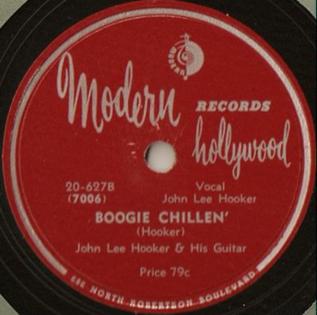
"Boogie Chillen'" or "Boogie Chillun" is a blues song first recorded by John Lee Hooker in 1948. It is a solo performance featuring Hooker's vocal, electric guitar, and rhythmic foot stomps. The lyrics are partly autobiographical and alternate between spoken and sung verses. The song was his debut record release and in 1949, it became the first "down-home" electric blues song to reach number one in the R&B records chart.
The Real Folk Blues is a series of blues albums released between 1965 and 1967 by Chess Records, later reissued MCA Records. Each album in the series highlighted the music of one major Chess artist, including John Lee Hooker, Howlin' Wolf, Muddy Waters, and Sonny Boy Williamson II. The series, overseen by Marshall Chess, was a reaction to the increasing audience for the blues following the British Invasion. Companion discs, titled More Real Folk Blues, were released for many of the artists. Hooker's companion disc was not released until 1991. Beginning in 1999 the albums were re-released as single-disc compilations.

Moanin' in the Moonlight is a compilation album and the first album by American blues artist Howlin' Wolf, released by Chess Records in 1959. It contains songs previously issued as singles, including one of his best-known, "Smokestack Lightning". Rolling Stone ranked it number 477 on its 2020 list of "the 500 Greatest Albums of All Time".

At Newport 1960 is a live album by Muddy Waters recorded during his performance at the Newport Jazz Festival on July 3, 1960. With his longtime backup band, Muddy Waters plays a mix of his older popular tunes and some newer compositions. Chess Records released the album in the United States on November 15, 1960.
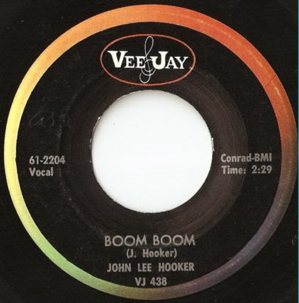
"Boom Boom" is a song written by American blues singer and guitarist John Lee Hooker and recorded October 26, 1961. Although it became a blues standard, music critic Charles Shaar Murray calls it "the greatest pop song he ever wrote". "Boom Boom" was both an American R&B and pop chart success in 1962 and a UK top-twenty hit in 1992.
"One Way Out" is a blues song that was recorded in the early 1960s by both Sonny Boy Williamson II and Elmore James. A reworking of the song by G. L. Crockett, titled "It's a Man Down Here", appeared on the Billboard record charts in 1965. In 1971, the Allman Brothers Band recorded an updated live version of the song, which was included on their popular Eat a Peach album (1972).
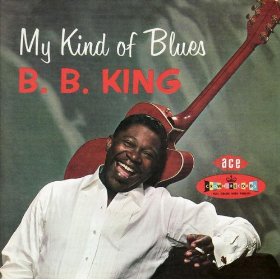
My Kind of Blues is the seventh studio album by American bluesman B.B. King. According to biographer David McGee, the songs were recorded in 1958 at the Chess Records studios in Chicago. However, researcher Colin Escott identifies the recordings as being from a March 3, 1960 session, when King was under contract to the Bihari brothers and recorded in the Los Angeles area.
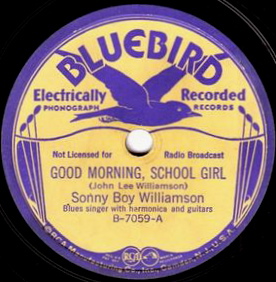
"Good Morning, School Girl" is a blues standard that has been identified as an influential part of the blues canon. Pre-war Chicago blues vocalist and harmonica pioneer John Lee "Sonny Boy" Williamson first recorded it in 1937. Subsequently, a variety of artists have recorded versions of the song, usually calling it "Good Morning Little Schoolgirl".
"Leave My Kitten Alone" is a song written by Little Willie John, Titus Turner, and James McDougal, first recorded by Little Willie John and released in 1959 as a single through King Records. It is an R&B song that follows a 24-bar blues format.

"One Bourbon, One Scotch, One Beer" is a blues song written by Rudy Toombs and recorded by Amos Milburn in 1953. It is one of several drinking songs recorded by Milburn in the early 1950s that placed in the top ten of the Billboard R&B chart. Other artists released popular recordings of the song, including John Lee Hooker in 1966 and George Thorogood in 1977.
Eddie "Guitar" Burns was an American Detroit blues guitarist, harmonica player, singer and songwriter. His career spanned seven decades. Among Detroit bluesmen, Burns was deemed to have been exceeded in stature by only John Lee Hooker.
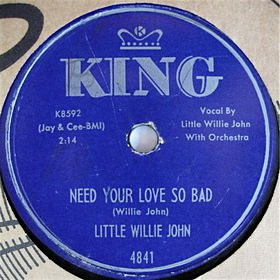
"Need Your Love So Bad", sometimes known as "I Need Your Love So Bad", is a song first recorded by Little Willie John in 1955. Called a "unique amalgam of gospel, blues and rhythm & blues", it was John's second single as well as his second record to reach the US charts.

His Best is a greatest hits album by Chicago blues harmonica player Little Walter, released on June 17, 1997 by MCA and Chess Records as a part of The Chess 50th Anniversary Collection. The album is seen as the CD successor to the 1958 The Best of Little Walter and features ten of the songs from that album.
"Sugar Mama" or "Sugar Mama Blues" is a blues standard. Called a "tautly powerful slow blues" by music journalist Charles Shaar Murray, it has been recorded by numerous artists, including early Chicago bluesmen Tampa Red, Sonny Boy Williamson I, and Tommy McClennan. John Lee Hooker and Howlin' Wolf later adapted "Sugar Mama" for electric blues and rock group Led Zeppelin reworked it during early recording sessions.
John Lee Hooker was an American blues singer and guitarist who recorded from 1948 to 2001. His discography includes recordings issued by various record companies in different formats.

"I'm in the Mood" is a blues song written and originally performed by John Lee Hooker, and first recorded by him in 1951. The original recording is reportedly one of the highest-selling blues records of all time.
Little Walter (1930–1968) was an American blues artist who is generally regarded as the most influential blues harmonica player of his era. Most of his earliest recordings were as a sideman, when he contributed harmonica to songs by Chicago blues musicians such as Jimmy Rogers and Muddy Waters. As the featured artist, he recorded the instrumental "Juke" in 1952. The single reached number one on the Billboard Rhythm and Blues chart and launched his career as a solo artist.











